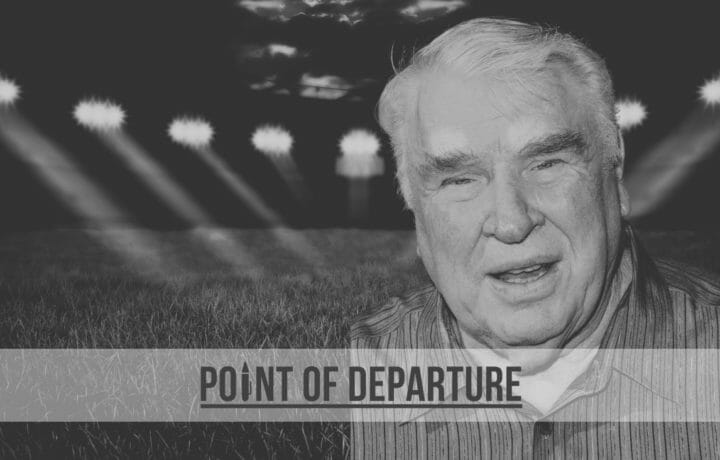As the final credits rolled on All Madden, the new documentary on the life of Hall of Fame football coach John Madden, it was hard not to choke up a little. If the tributes weren’t enough to push you over the edge, knowing he saw it only three days before his death last week provided the final nudge.
All of us grew up with Coach Madden. As he was fond of saying, people who knew him as the coach of the Oakland Raiders called him “Coach;” people who played his video game simply called him “Madden.” Whether as the exuberant face of the Raiders in the 70s, an animated television advertising icon, a dynamic telestrating analyst and announcer, or the face of a multi-billion-dollar video game franchise, we all knew him.
MADDEN’S RULES
A child of the 1970s, I grew on the west coast where Sunday football meant watching the Raiders every week, with a random mix of whatever other teams might be playing. Those were the days of Ken Stabler and Fred Biletnikoff casually smoking on the sidelines while the feared Raiders defense punished whoever showed up in Oakland Coliseum that weekend. A team stacked with future Hall of Famers, led by a large, boisterous man wearing his omnipresent sideline pass on the belt loop of his pants.
Coach was larger than life. His personality defied the adjectives used for the coaches of that era. He was to professional football what the Tasmanian Devil was to Saturday morning cartoons. He was the theatrical face of professional football, a character so captivating you couldn’t turn away. And I didn’t.
As a professional coach, he never had a losing season. He set a standard for winning that has never been equaled, including a Super Bowl victory in 1977. As a coach, he led with three simple rules:
- Be on time.
- Pay attention.
- Play like all hell when I tell you to.
By the time he’d retired from coaching and entered the broadcasting booth, he’d become the wall-smashing, arm-flailing pitchman for everything from light beer to foot fungus cream. But those rules remained the foundation of everything he did, rules that influenced everyone from players on the field to the creative team that worked with him on the Madden video game.
A COACH’S WISDOM
Listening to the tributes offered in All Madden, it’s clear that John Madden had an enduring and positive impact everywhere he went. His words left behind meaning for so many, and those words proved memorable in myriad ways.
1. “The only yardstick for success our society has is being a champion. No one remembers anything else.”
We’ve heard this said many ways, from Knute Rockne to Vince Lombardi. If you’re going to compete, compete to win. Give it your best and never look back.
2. “A coach is just a guy whose best class in grammar school was recess and whose best class in high school was P.E. I never thought I was anything but a guy whose best class was P.E.”
This is standard self-deprecating John Madden humor. It’s also a reminder: never take yourself too seriously.
3. “Self-praise is for losers, be a winner. Stand for something. Always have class and be humble.”
Humility is the most underrated leadership trait. If you’re a true champion, you let others sing your praises while you continue to grind. That’s what you stand for.
4. “If you make a mistake, admit it quickly and emphatically and don’t dwell on it.”
We all make mistakes. Don’t dwell on them. Embrace them, learn from them, grow from them.
5. “The road to Easy Street goes through the sewer.”
Of all the great John Madden quotes, this one speaks for itself. No explanation should be necessary.
6. “If a guy doesn’t work hard and doesn’t play well, he can’t lead anything. All he is, is a talker.”
If you want to lead, let your work ethic and team focus do your talking. Not your mouth.
7. “Coaches have to watch for what they don’t want to see and listen to what they don’t want to hear.”
This applies to leadership, as well. You have to keep your eyes and ears open at all times. You have to be willing to take the bad news with the good. The standard you walk past is the standard you accept.
8. “If you can’t run with the big dogs, stay on the porch.”
If you’re not willing to put in the time and commit the effort required to win, then just don’t. Stay in your comfort zone. Embrace the status quo. Don’t be all you can be.
9. “Don’t worry about the horse being blind, just load the wagon.”
Focus on what you can control and dedicate yourself to doing your best. Let go of the things you can’t control. Find a little serenity.
10. “Discipline is knowing what you’re supposed to do and doing it as best you can.”
Real discipline, the kind that leads to championships – and major successes – begins in your head and your heart. It’s knowing what needs to be done and rolling up your sleeves to do it. Day after day, week after week. Never give up. Stay focused. And keep working until you’re the standard everyone else looks to.
Boom!
No look back on the words of John Madden would be complete without at least acknowledging the one word he was probably known most for: BOOM! I don’t think he ever called a game in which he didn’t use that word at least once, as in “Boom, boom, foom, poom! He just ran right at ‘em!!” Whenever I heard that word, I always think of John Madden – bursting through a wall, drawing on a telestrator, or just excitedly watching a game play out live. We’ll miss you, coach.




